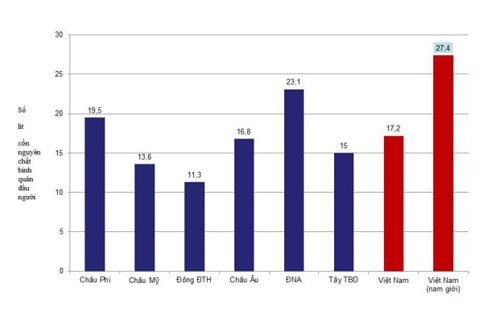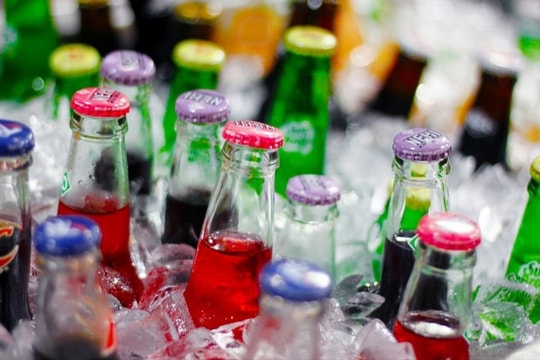Alcohol is one of the top 10 causes of death in the world.
According to the International Agency for Research on Cancer, there is no safe alcohol consumption threshold to prevent cancer, but it increases the risk of oral, throat, and colorectal cancers...
Alcohol is one of the top 10 causes of death in the world. The Global Status Report on Alcohol and Health 2014 shows that 3.3 million people died from alcohol-related causes. Of these, cancer is the fourth leading cause of death, accounting for 12.5%, after cardiovascular disease, diabetes, accidents and injuries, and digestive diseases.
Dr. Tran Quoc Bao, Department of Infectious Disease Control, Department of Preventive Medicine, Ministry of Health said that the harmful effects of alcohol consumption depend on the way of drinking and the amount of drinking. It is toxic to cells, has a bio-metabolic impact on cells, thereby leading to chronic diseases, non-communicable diseases such as cancer, high blood pressure. Alcohol and ethanol are classified by the International Agency for Research on Cancer (IRAC) as carcinogens including: cancer of the oral cavity, throat, larynx, esophagus, colon, liver and breast cancer in women. Accordingly, there is no safe alcohol consumption threshold to prevent cancer.
 |
| Vietnam has become the country with the highest beer consumption in Southeast Asia and the third in Asia, after Japan and China. Chart of average alcohol consumption per drinker (over 15 years old): Department of Preventive Medicine, Ministry of Health. |
A review of recent studies on alcohol and cancer risk by the UK Committee on Carcinogens (CoC) has also supported the conclusion that alcohol consumption, even in small amounts, increases the risk of some cancers compared to non-drinkers. The risk of alcohol-related cancers decreases over time after stopping drinking, but it may take many years before the risk falls to the level of people who have never drunk alcohol.
The evidence has led to the UK's Chief Medical Officer changing its alcohol guidelines for men. Specifically, men should not drink more than 14 units a week, the same level is recommended for women. This is equivalent to six pints of medium strength beer a week, which will keep the risk of cancer and other diseases low. Previous guidelines were 21 units for men and 14 units for women a week (a UK unit is equivalent to about 8g of pure alcohol).
According to Associate Professor Nguyen Nghiem Luat, former Head of the Department of Chemistry and Biology, Hanoi Medical University; some studies have shown that, with cancers of the mouth, throat, larynx, esophagus, people who drink about 1.5 units of alcohol a day have a risk about 5 times higher than those who never drink or only drink occasionally. Even people who only drink no more than one glass a day have a risk 20% higher than those who do not drink alcohol.
For breast cancer, people who regularly drink small amounts of alcohol can also increase the risk. A woman who drinks about 1.5 units of alcohol a day can increase the risk of breast cancer by 5%; for every additional 10g/day, the risk of breast cancer increases by about 7-12%. In addition, many studies have shown that people who drink only small amounts of alcohol (2 units a day, equivalent to about half a liter of beer or a large glass of wine) also have a 9% increased risk of colorectal cancer compared to people who do not drink alcohol.
Therefore, to reduce the risk of cancer and other related diseases, the International Agency for Research on Cancer (IRAC) advises people not to drink alcohol or, if they do drink, to limit the amount as follows:
- Healthy men and women should not drink more than 2 units of alcohol a day to reduce the risk of disease and injury.
- Do not drink more than 4 units of alcohol at any one time to reduce the risk of alcohol-related injuries.
- People under 18 years old should not drink alcohol.
- Pregnant or breastfeeding women should not drink alcohol, as it can harm the fetus and breastfeeding child.
- To reduce the amount of alcohol absorbed into the body, you must have several days without drinking alcohol in a week.
One World Health Organization unit of alcohol is equal to 10g of pure alcohol, equivalent to 3/4 of a 330ml bottle of beer (5%), a 100ml glass of wine (13.5%), a 330ml glass of draft beer, or a 30ml shot of spirits (40%).
According to vnexpress
| RELATED NEWS |
|---|







.jpg)
